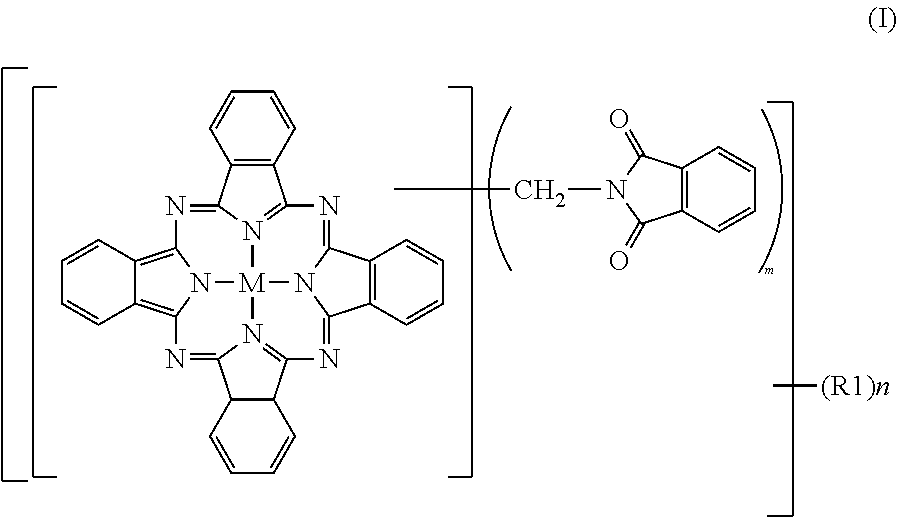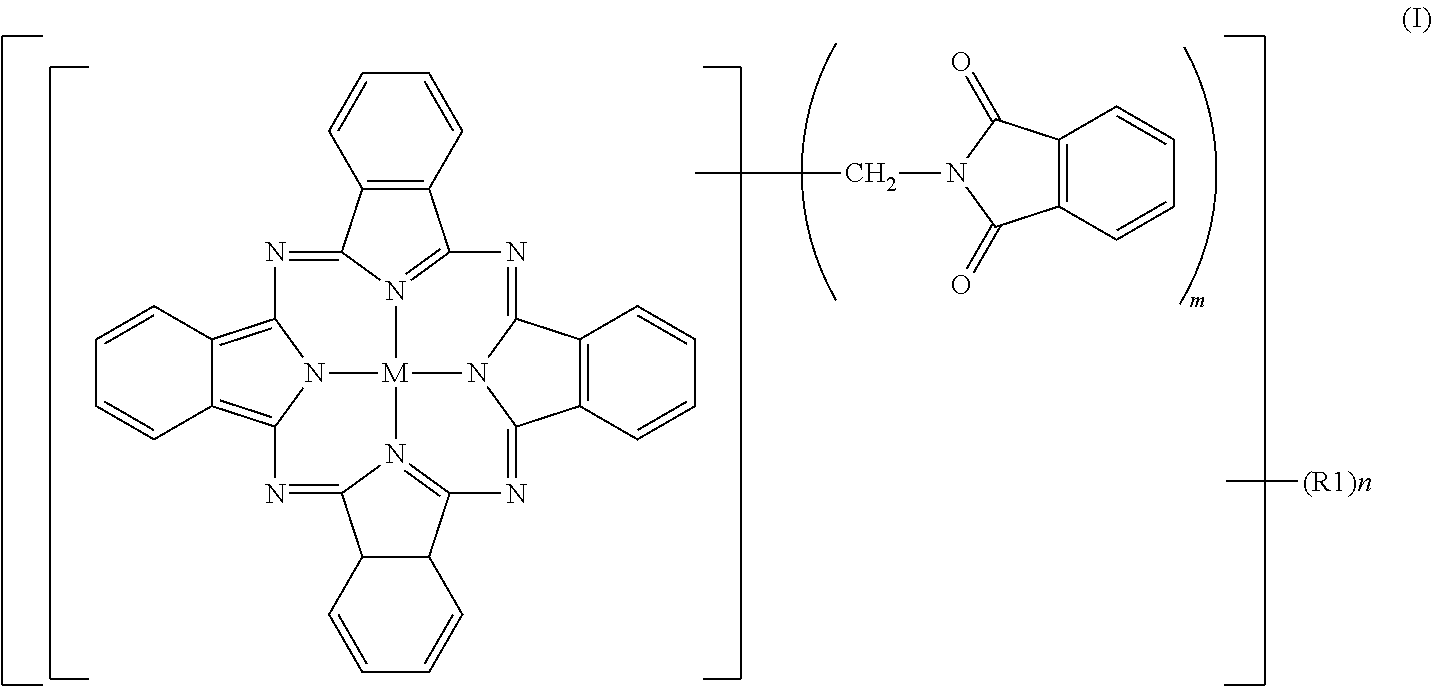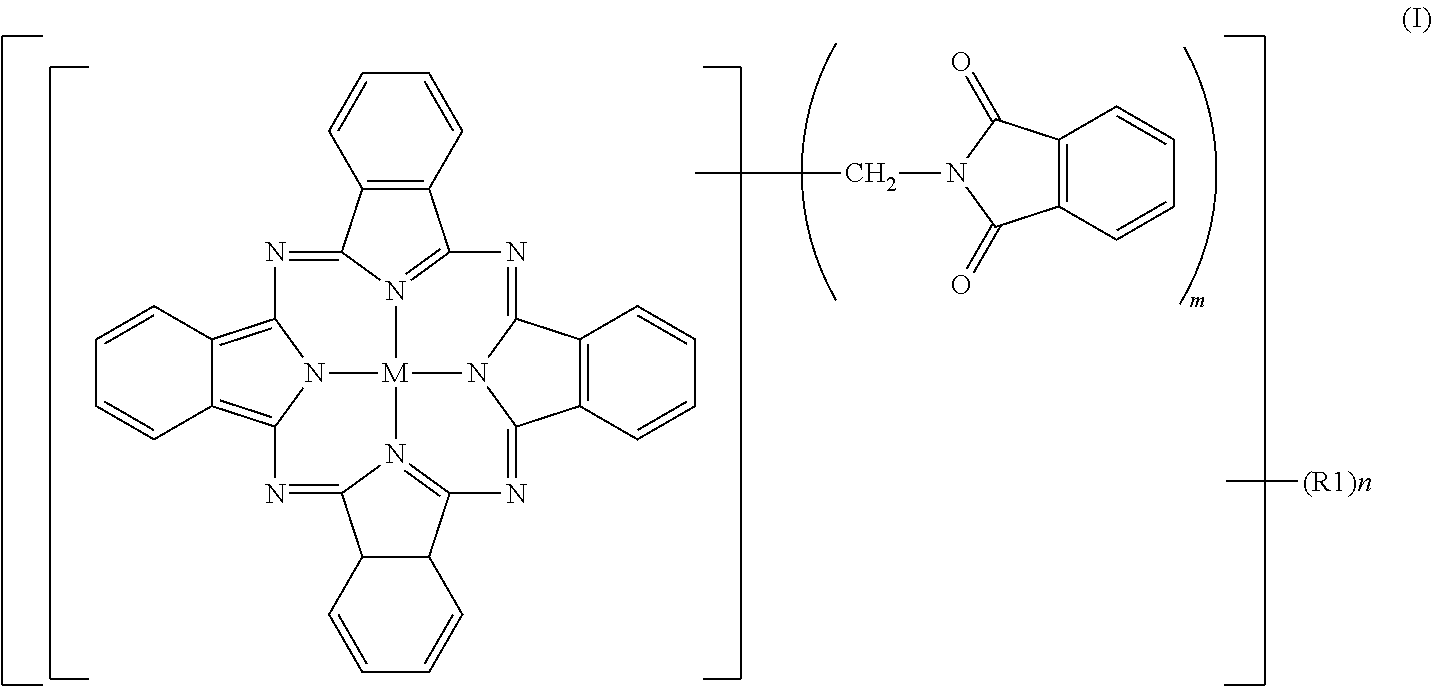Greenish blue pigment, colorant composition containing said pigment, and image recording material
a technology colorant composition, which is applied in the field of greenish blue pigment, colorant composition containing said pigment, image recording material, etc., can solve the problems of inapplic inability to obtain colorful images, and inability to use the mixture of copper phthalocyanine and nickel phthalocyanine described in patent documents 3 and 4 to achieve excellent safety, high chroma, and high chroma
- Summary
- Abstract
- Description
- Claims
- Application Information
AI Technical Summary
Benefits of technology
Problems solved by technology
Method used
Image
Examples
example 1
[0095]To 2% fumed sulfuric acid (480 parts), crude copper phthalocyanine (30 parts), paraformaldehyde (15.8 parts) and phthalimide (45.8 parts) were gradually added while maintaining a temperature not higher than 55° C., followed by stirring for 30 minutes until dissolution. The reaction mixture was heated over 1 hour to 70° C., and a reaction was then conducted at 70 to 75° C. for 7 hours. After completion of the reaction, the reaction mixture was poured into water (2,000 parts) for precipitation. The resulting slurry was heated at 90° C. for 30 minutes, and was then filtered. The thus-obtained filter cake was washed with water until neutral, and was then dried at 100° C. for 12 hours. The product had a purity of 80.0%, and contained 2.3 phthalimidomethyl groups (m) and 0.06 sulfonic group (n). The product was deflocculated in its entirety in a mixture of water (1,500 parts) and soda ash (15 parts). Subsequent to stirring under heat at 50° C. for 2 hours, the product was collected ...
example 2
[0097]To 100% sulfuric acid (354 parts), crude copper phthalocyanine (30 parts) was added little by little while maintaining a temperature not higher than 55° C., followed by stirring for 30 minutes until dissolution. Subsequently, hydroxymethylphthalimide (50.6 parts) and acetic anhydride (29.7 parts) were added. The reaction mixture was heated over 1 hour to 70° C., and a reaction was conducted at 70 to 75° C. for 6 hours. After completion of the reaction, water (2,000 parts) was added for precipitation, and the resulting slurry was filtered. The thus-obtained filter cake was washed with water, and was then dried at 100° C. for 12 hours to obtain a product (66.0 parts). The product contained, as average numbers of substituent groups, 3.05 phthalimidomethyl groups (m) and 0.05 sulfonic group (n) and exhibited a colorful, bluish green color, but its tinting power was a little inferior because its purity was 82.3%, that is, a little low. The product was deflocculated in its entirety ...
example 3
[0099]To 100% sulfuric acid (354 parts), crude copper phthalocyanine (30 parts) was added little by little while maintaining a temperature not higher than 55° C., followed by stirring for 30 minutes until dissolution. Subsequently, hydroxymethylphthalimide (33.7 parts) and acetic anhydride (19.4 parts) were added. The reaction mixture was heated over 1 hour to 100° C., at which a reaction was conducted for 5 hours. After completion of the reaction, the reaction mixture was cooled to 70° C. under stirring, water (2,000 parts) was added for precipitation. The resulting slurry was heated at 90° C. for 30 minutes, and then filtered. The thus-obtained filter cake was washed with water until neutral, and was then dried at 100° C. for 12 hours to obtain a colorful bluish green product (59.6 parts). The purity of the thus-obtained product was 95.9%. As the average numbers of substituent groups, 3.2 phthalimidomethyl groups (m) and 0.48 sulfonic group (n) were contained.
[0100]On the thus-obt...
PUM
| Property | Measurement | Unit |
|---|---|---|
| melting point | aaaaa | aaaaa |
| transparency | aaaaa | aaaaa |
| reaction temperature | aaaaa | aaaaa |
Abstract
Description
Claims
Application Information
 Login to View More
Login to View More - R&D
- Intellectual Property
- Life Sciences
- Materials
- Tech Scout
- Unparalleled Data Quality
- Higher Quality Content
- 60% Fewer Hallucinations
Browse by: Latest US Patents, China's latest patents, Technical Efficacy Thesaurus, Application Domain, Technology Topic, Popular Technical Reports.
© 2025 PatSnap. All rights reserved.Legal|Privacy policy|Modern Slavery Act Transparency Statement|Sitemap|About US| Contact US: help@patsnap.com



